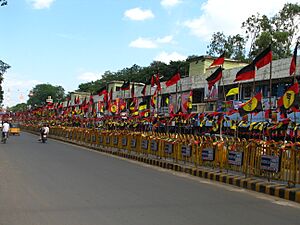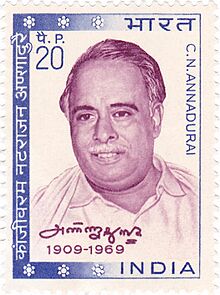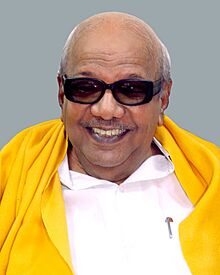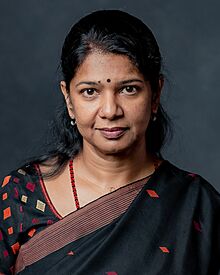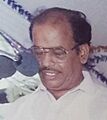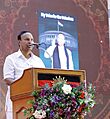Dravida Munnetra Kazhagam facts for kids
Quick facts for kids
Dravida Munnetra Kazhagam
|
|
|---|---|
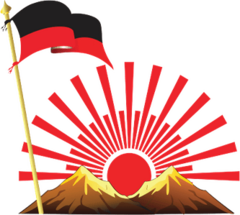 |
|
| Abbreviation | DMK |
| President | M. K. Stalin |
| Parliamentary Chairperson | Kanimozhi Karunanidhi |
| Lok Sabha leader | T. R. Baalu |
| Rajya Sabha leader | Tiruchi Siva |
| Founder | C. N. Annadurai |
| Founded | 17 September 1949 |
| Split from | Dravidar Kazhagam |
| Preceded by | Justice Party (1917–1944) Dravidar Kazhagam (1944–1949) |
| Headquarters | Anna Arivalayam, 367–369, Anna Salai, Teynampet, Chennai - 600018, Tamil Nadu, India |
| Student wing | Maanavar Ani |
| Youth wing | Ilaignar Ani |
| Women's wing | Magalir Ani |
| Labour wing | Labour Progressive Federation (LPF) |
| Ideology |
|
| Political position | Centre-left to left-wing |
| ECI Status | State Party |
| Alliance |
Former Alliances
|
| Seats in Lok Sabha |
22 / 543
|
| Seats in Rajya Sabha |
10 / 245
|
| Seats in Tamil Nadu Legislative Assembly |
134 / 234
|
| Seats in Puducherry Legislative Assembly |
6 / 30
|
| Number of states and union territories in government |
1 / 31
|
| Election symbol | |
 (The rising sun) |
|
| Party flag | |
 |
|
The Dravida Munnetra Kazhagam (DMK) is a major political party in India. Its name means "Dravidian Progressive Federation." The party is mainly active in the state of Tamil Nadu and the union territory of Puducherry.
The DMK was founded on September 17, 1949, by C. N. Annadurai. He was a popular leader often called "Anna," which means "elder brother." The DMK was formed from an earlier group called the Dravidar Kazhagam.
Annadurai led the party until he passed away in 1969. In 1967, the DMK became the first party besides the Indian National Congress to win a state election with a clear majority. After Annadurai, M. Karunanidhi became the party's leader. He served as the Chief Minister of Tamil Nadu five times.
Today, the DMK is led by M. K. Stalin, who is Karunanidhi's son. He became the Chief Minister of Tamil Nadu in May 2021. The DMK is the fifth-largest party in the Lok Sabha, which is one of the two houses of India's Parliament.
Contents
History of the DMK Party
How the Party Began
The DMK's story starts with the Justice Party, which was formed in 1916. This party wanted to make sure that people who were not from the Brahmin caste had equal opportunities in government jobs and society. This idea of social equality became a key part of the Dravidian movement.
A famous leader named Periyar joined the Justice Party. He also started the Self-Respect Movement, which fought against the caste system. In 1944, Periyar combined the Justice Party and the Self-Respect Movement to create the Dravidar Kazhagam (DK). The DK was a social movement, not a political party that runs in elections.
However, some of Periyar's followers, including C. N. Annadurai, believed they should participate in elections to bring change. This disagreement led Annadurai and his supporters to leave the DK. In 1949, they formed their own party, the Dravida Munnetra Kazhagam (DMK).
The Annadurai Era (1949–1969)
The DMK first ran in elections in 1957 and won 15 seats in the state government. By 1962, it had won 50 seats and became the main opposition party.
Protests Against Hindi
The DMK strongly believed that the Hindi language should not be forced upon the people of Tamil Nadu. In the 1950s and 1960s, the party led many protests, known as the anti-Hindi agitations.
One famous protest was in 1953 in a town called Kallakudi. The government wanted to change the town's name to Dalmiapuram. The DMK felt this new name represented North India's influence over the South. M. Karunanidhi and other DMK members protested by lying on the railway tracks.
The DMK continued to argue that English should remain an official language alongside Tamil. They did not want Hindi to be the only official language of India.
Forming a Government
In 1967, the DMK won the state election in what was then called Madras State. This was a huge victory. It was the first time a party other than the Indian National Congress had won a clear majority in any Indian state. This marked the beginning of the "Dravidian era" in Tamil Nadu politics.
Annadurai's Achievements
As Chief Minister, Annadurai made several important changes.
- He legalized self-respect marriages. These are weddings that do not need a priest and can happen between people of different castes.
- His government officially renamed Madras State to Tamil Nadu, which means "Land of the Tamils."
- He introduced a two-language policy for schools. This meant students would study Tamil and English, instead of a three-language formula that included Hindi.
The Karunanidhi Era (1969–2018)
After Annadurai passed away in 1969, M. Karunanidhi became the leader of the DMK. He led the party for almost 50 years, until his death in 2018.
In the 1970s, a famous actor and party member, M. G. Ramachandran (M.G.R.), had disagreements with Karunanidhi. In 1972, M.G.R. left the DMK and started his own party, the All India Anna Dravida Munnetra Kazhagam (AIADMK). This created a long-lasting rivalry between the two parties.
Over the next few decades, the DMK and AIADMK took turns ruling Tamil Nadu. The DMK was in power from 1989 to 1991, 1996 to 2001, and 2006 to 2011 with Karunanidhi as Chief Minister.
During his time as leader, some of Karunanidhi's family members also became important figures in politics. This led to discussions about family influence in the party. His son, M. K. Stalin, served as Deputy Chief Minister, and his daughter, Kanimozhi, became a Member of Parliament.
The M. K. Stalin Era (2018–Present)
After his father's death in 2018, M. K. Stalin became the president of the DMK. He had been active in the party for many years, starting from the youth wing.
In the 2019 general election, the DMK and its allies, under Stalin's leadership, had a big victory. They won 39 out of 40 parliamentary seats in Tamil Nadu and Puducherry.
In the 2021 state election, the DMK-led alliance won 159 out of 234 seats. M. K. Stalin became the Chief Minister of Tamil Nadu for the first time.
What the DMK Believes In
The DMK's main ideas are based on the principles of Duty, Dignity, and Discipline, as taught by C. N. Annadurai.
- Social Justice: The party works for the welfare of Other Backward Classes (OBCs) and Scheduled Castes and Tribes. It supports reservation policies to ensure these groups have fair opportunities in education and jobs.
- State Autonomy: The DMK believes that states should have more power to govern themselves. It supports a federal system where power is shared between the central government and state governments.
- Language Policy: The party is committed to protecting and promoting the Tamil language. It continues to oppose any effort to make Hindi a required language in Tamil Nadu.
Party Symbol and Flag
The DMK's election symbol is a rising sun between two mountains. This symbol was inspired by a play written by M. Karunanidhi and represents the "rising" spirit of the Dravidian people. The party's flag is half black and half red. The black represents the struggles of the people, and the red represents the effort to create a better future.
List of Party Leaders
Presidents
| No. | Portrait | Name (Birth–Death) |
Term in office | ||
|---|---|---|---|---|---|
| Assumed office | Left office | Time in office | |||
| 1 | 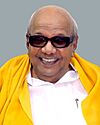 |
M. Karunanidhi (1924–2018) |
27 July 1969 | 3 January 2017 | 47 years, 160 days |
| Working | M. K. Stalin (born in 1953) |
4 January 2017 | 27 August 2018 | 9 years, 41 days | |
| 2 | 28 August 2018 | Incumbent | |||
General Secretaries
| No. | Portrait | Name (Birth–Death) |
Term in office | ||
|---|---|---|---|---|---|
| Assumed office | Left office | Time in office | |||
| 1 | 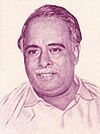 |
C. N. Annadurai (1909–1969) |
17 September 1949 | 3 February 1969 | 19 years, 139 days |
| 2 |  |
V. R. Nedunchezhiyan (1920–2000) |
4 February 1969 | 16 May 1977 | 8 years, 101 days |
| 3 | 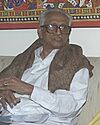 |
K. Anbazhagan (1922–2020) |
17 May 1977 | 7 March 2020 | 42 years, 295 days |
| 4 |  |
Duraimurugan (born in 1938) |
9 September 2020 | Incumbent | 5 years, 158 days |
Chief Ministers from the DMK
Chief Ministers of Tamil Nadu
| No. | Portrait | Name (Birth–Death) |
Term in office | Assembly Election |
|
|---|---|---|---|---|---|
| Start | End | ||||
| 1 |  |
C. N. Annadurai (1909–1969) |
6 March 1967 | 3 February 1969 | 4th (1967) |
| 2 |  |
M. Karunanidhi (1924–2018) |
10 February 1969 | 15 May 2011 | Served 5 separate terms |
| 3 | M. K. Stalin (born 1953) |
7 May 2021 | Incumbent | 16th (2021) |
|
Media Connections
The DMK party runs a daily newspaper in Tamil called Murasoli and a weekly journal in English called The Rising Sun.
Kalaignar TV is a television channel that was started in 2007. It is managed by family members of the late leader M. Karunanidhi. The network has several channels, including ones for music, news, and comedy.
Images for kids
 | Bessie Coleman |
 | Spann Watson |
 | Jill E. Brown |
 | Sherman W. White |


